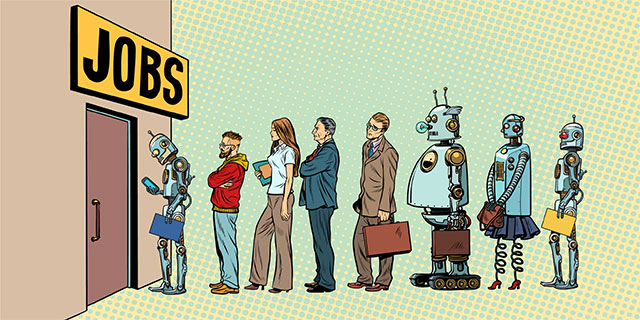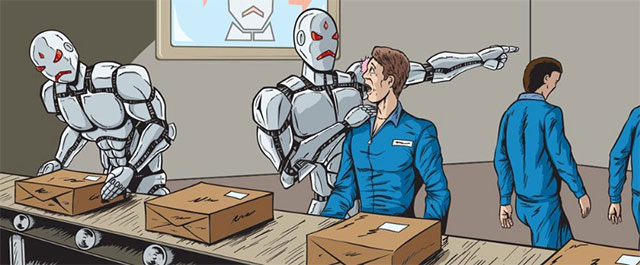91% of technology managers believe that AI will be the center of the next technology revolution
Recently, Edelman's AI specialized center - a large group in advertising and media, conducted a real survey of more than 1,000 Americans, and 300 executives are currently holding role of managing large technology companies. Summarizing and carefully analyzing each answer, Edelman's experts found that more than 60% of the public and 54% of technology executives think that the field of artificial intelligence needs to be regulated, yes. implementation directions to ensure the development of the technology industry in particular, and all humanity in general.
More specifically, Edelman Artificial Intelligence is a survey conducted to explore issues around the field of AI, from the obvious positives that AI impacts on health care, health, until concerns about ethics when this technology is widely applied.
'We realize that almost everyone is curious about the real benefits of AI, but there are still considerable doubts and worries about using AI that can lead to losing jobs. wide-ranging, inequality in income and above all, the issue of social management ', Sanjay Nair, expert responsible for the shared survey.

- AI engineer Facebook talks about deep learning, new programming languages and hardware for artificial intelligence
According to Edelman analysts, in general, ordinary people tend to be more skeptical about AI than leading technology managers when it comes to the future impact of this technology on every field. areas in life, especially employment issues. More specifically, about 54% of the people surveyed believe that AI will have a negative impact on the poor, while this is only about 43% of the executives surveyed. At the same time, most believe that automation and other forms of technology that restrict other workers will be more beneficial for the wealthy.
These numbers are more or less consistent with the previous statistics. The World Economic Forum, PricewaterhouseCoopers, Gartner and McKinsey Global Research Institute predict that the AI will 'seize' up to 75 million jobs by 2025, and at the same time reduce the proportion of people involved in these areas. Basic digital from 40% to 30% in 2030, when the demand for jobs that require higher skills increases. Moreover, McKinsey also predicted that changes in the labor market will lead to an increase of about 1.2% in the growth of global gross domestic product (GDP) over the next 10 years, and at the same time help Humanity gains an additional 20 to 25% of net economic benefits (equivalent to about 13 trillion dollars globally) over the next 12 years.

- [Infographic] Future work when artificial intelligence gradually replaces people
In general, the majority of respondents believe that AI will benefit all industries. In particular, the most obvious will be in areas such as biotechnology, life science, telecommunications, manufacturing, energy, health care, transport and infrastructure, agriculture and retail. and financial services.
Besides, executives are also completely optimistic about the prospects of AI compared to ordinary people. Specifically, 51% of technology managers feel "excited" when thinking about the future of the world with the full impact of AI, while this figure for ordinary people is only 31%. On the other hand, 33% of people feel 'worried' about the negative impact of AI, while only 28% of technology managers think so. In particular, up to 9 out of 10 members of C-suite (the highest management group of a company and named after the "c" initials, such as CEO (CEO), CEO CFO and CFO) has described AI as the most important nucleus in the next technological revolution of mankind, and at the same time 8 out of 10 people interviewed agreed to receive This decision, despite concerns about employment and social ethics.

- [Infographic] Benefits and hazards from Artificial Intelligence
Thus it can be seen that the majority of the people Edelman surveyed believe that the AI will lead to the emergence of many models of extensive improvement, such as production rationalization and improved delivery. business decision. Specifically, 94% of technology executives and 85% of people think that AI will help create smart, creative houses, and more than 74% say that the technology will change the entire automotive industry. automation and self-propelled vehicles with existing foundations are companies like Waymo, Uber, GM Cruise and many other potential businesses.
In addition, most agree that AI will have a positive impact on quality of life. Approximately 91% of executives and 76% of the general public are somewhat or fully agree that some of the current difficult and dangerous tasks will be transferred to machines, thus contributing to helping good quality of life in general. Besides, AI can also improve the quality of people's lives by helping us live longer and getting better care through smart home devices. However, the majority of respondents (65% of CEOs, 75% of people) believe that will also lead to more serious isolation in life, people will be less interactive with each other, as well as the AI will reduce creativity and freedom in thinking.
Therefore, nearly 60% of people in general and 54% of executives think that AI development guidelines should be applied and developed by state authorities, while less than 20% (15 % and 17%) believe that the industry can adjust itself to the global development trend. At the same time, 63% of respondents said that technology companies would have to prove that AI will improve lives, create jobs and specify ways to improve local and national economies. how And more than 70% say technology companies also need to use AI to improve society, as well as the long-term consequences that it can cause.

- McAfee expert explained how deepfake and AI are drilling through the cyber security wall
According to Kay Firth-Butterfield, head of artificial intelligence and machine learning at the World Economic Forum, this study by Edelman draws us a picture that is both deep and detailed, and copper the time also raises many profound problems that humanity needs to work together to solve. Since then, it is clear that businesses and governments need to think carefully and come up with a plan to act properly in many issues to ensure that the potential impacts of AI do not cause society to lose benefits. obviously can be accumulated from technology. The key issue is that mankind must be aware of the risk factors associated with this type of technology transformation, while creating an environment where benefits can be spread proportionately. and comprehensive in the whole society.
You should read it
- ★ How does Al revolution help us answer the most fundamental problems of philosophy? (Part 2)
- ★ How does Al revolution help us answer the most fundamental problems of philosophy? (Part 1)
- ★ How does Al revolution help us answer the most fundamental problems of philosophy? (End)
- ★ Watching pictures painted by artificial intelligence, everyone thinks that is the work of a true artist
- ★ Artificial intelligence learns to create another artificial intelligence, replacing people in the future